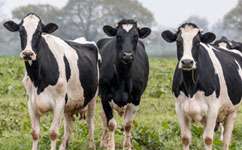Halving your meat intake would be good for the environment

We should all swap at least half of the meat, dairy products and eggs we eat with cereals, lentils, beans and other plant-based foods to help reduce nitrogen pollution, lower greenhouse gas emissions and improve our health.
That's the conclusion scientists have come to after analysing the effects of a typical Western diet on the environment. Their findings are published in Global Environmental Change.
The study found that halving our intake of red meat, dairy goods and eggs would cut nitrogen pollution by 40 per cent and methane emissions from livestock such as cows by up to 40 per cent. Changing our diet would lead to a 25 per cent drop in land needed for food production.
There may also be health benefits from a less meat-focused diet: not eating so much saturated fat could reduce the risks of heart disease.
Livestock farming relies on large areas of land to grow grain and grasslands for animal feed. It's also one of the biggest causes of nitrogen pollution – run-off from manure and nitrogen-based fertilisers pollutes rivers and lakes, and reactive nitrogen in the form of ammonia seeps out of dung heaps and pollutes the air. Not just that, but nitrous oxide from agricultural soils is a greenhouse gas.
'Nitrogen pollution from livestock farming affects air, water and land quality, and fuels climate change – it has an all-round environmental hit. But changing how we eat will have a benefit on all of these things,' says Professor Mark Sutton of NERC's Centre for Ecology & Hydrology, one of the report's authors.
The study's authors admit that making such drastic changes to our diet would have far-reaching economic repercussions for the agricultural and food industries.
Previous studies have revealed that a change in diet could lead to strong regional effects, with gains in areas of high-quality arable land and losses of income on less suitable land, particularly in Scotland and Wales.
But the land that would have been used to grow grain to feed livestock could be used to grow biofuels or crops for export, helping Europe become a major crop exporter and reducing the continent's reliance on soymeal for animal feed.
'The negatives should be offset by the possibility to explore the economic opportunities and how to achieve a smooth transition, where high-quality livestock products with best environmental practices grow in importance,' says Sutton.
'If you want a cleaner world, then change is needed. Or we live with a deteriorating world and suffer the consequences. And with an expanding population, there's an even greater need to make more efficient use of available crop products.'
Most of us eat more meat and dairy-type proteins than we need to meet World Health Organisation dietary recommendations. Indeed, there is a growing consensus among scientists that changing the Western diet could be beneficial for our health and the environment.
'Even with a 50 per cent reduction in all animal products, compensated by additional cereal and pulses consumption the mean EU intake of proteins would still be more than 50 per cent higher than would be required,' write the authors.
Whether or not such a change in diet is realistic is yet to be determined. In their report, the authors discuss the idea of making meat and dairy products more expensive, by taxing them or the environmental effects of producing them. But Sutton points out that there are many possible policy options to be considered.
'It is obvious that many would prefer a voluntary approach and hope that market forces work. But depending on how far society wanted to go, there could be a case for some form of incentive or link to regulations. But that is for society and governments to decide. Our task as scientists is to highlight the strength of these food-choice relationships,' says Sutton.
'If Europe was to lead the way in changing diets, the hypothesis is that it would be such a big thing that it would lead to an international ripple effect with knock-on consequences. The big question is whether the idea could catch on, leading to new cultural aspirations across the world.'
'One option is to try the demitarian approach – eating half the amount of meat. You don't need to be a full vegetarian to make a difference,' he adds.
More information: Henk Westhoek, Jan Peter Lesschen, Trudy Rood, Susanne Wagner, Alessandra De Marco, Donal Murphy-Bokern, Adrian Leip, Hans van Grinsven, Mark A. Sutton, Oene Oenema, "Food choices, health and environment: Effects of cutting Europe's meat and dairy intake," Global Environmental Change, published 25th April 2014, dx.doi.org/10.1016/j.gloenvcha.2014.02.004
Provided by PlanetEarth Online
This story is republished courtesy of Planet Earth online, a free, companion website to the award-winning magazine Planet Earth published and funded by the Natural Environment Research Council (NERC).



















